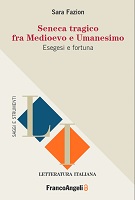Seneca tragico fra Medioevo e Umanesimo
Esegesi e fortuna
Abstract
The reception of Seneca’s Tragedies had a crucial moment during the 14th and early 15th centuries. In this period, after their recent rediscovery but before the extraordinary circulation across Europe in the Renaissance, Seneca’s plays attracted the attention of scholars and poets, and also of some exegetes who taught in Italian universities and schools. These cultural places represented a formidable medium for the dissemination of the Tragedies and the exegetical materials produced around them. In particular, an important role was played by Petrarch and Boccaccio, who read Tragedies and evoked them in their works, but also by some exegetes-professors such as Giovanni del Virgilio, Pietro da Moglio, Domenico Bandini, Bartolomeo del Regno and Petrus Parmensis, who focused their commentaries and lectures on Seneca’s plays.
So, at first, this volume recalls the narrow spread of Seneca’s Tragedies up to Early Middle Ages, and examines their rediscovery, that was realized by Nicolaus Trevet and Paduan prehuminists Lovato de’ Lovati and Albertino Mussato, but which took place also in Tuscany and Bologna. Then, the book analyses the philological and interpretative reception of the Tragedies by Petrarch and Boccaccio, and the allusions to Seneca’s plays in the Expositio on Ovid’s Metamorphoses by Bolognese professor Giovanni del Virgilio, who may have influenced Petrarch. Furthermore, great attention is paid to the exegetic activity of Pietro da Moglio, professor in Bologna and Padua and author of poetic summaries of the Tragedies that were very popular. In detail, the volume contains a new edition of these text, which updates Giuseppe Billanovich’s edition on the basis of many recently rediscovered manuscripts. Then, the book explores the interest in Tragedies shown by Domenico Bandini, teacher in Bologna and Tuscany and close friend of Coluccio Salutati. A pupil of the latter, Lorenzo Ridolfi, in his youth wrote – almost certainly on Salutati’s advice – a proem and some original summaries of the Tragedies, an edition of which is offered in this volume for the first time. New investigations are also focused on the exegetical activity of Bartolomeo del Regno, student of Pietro da Moglio and professor in Bologna, and on an important manuscript of the Tragedies linked to him. Good attention is also given to the original glosses on the Tragedies written by Petrus Parmensis in a manuscript adorned with elegant miniatures, that show special features compared to the illustrations in other codices and textual commentaries composed by Trevet and Mussato.
This continuous exegesis, multifaceted and also open to dialogue with the art of illumination, represented an indispensable point of reference for the pupils of such professors, including Coluccio Salutati, Francesco da Fiano and Francesco Piendibeni da Montepulciano, who were students of Pietro da Moglio before becoming humanists. After all, the book underlines that Francesco da Fiano and Francesco Piendibeni knew Seneca’s dramas, but also analyses the manuscript of Tragedies copied and annotated by Coluccio Salutati and lists all quotations from this plays in his Epistolary and De laboribus Herculis. Therefore, the ways followed by exegesis and fortune of Tragedies in the 14th century and at dawn of 15th, analyzed in this volume, offer an example of the multiple routes of the text’s tradition, but also an eloquent paradigm of the fact that Middle Ages and Humanism, far from being conceived as historical categories, in this era could productively dialogue on the level of hermeneutics and dissemination of knowledge.
Keywords
Seneca’s Tragedies, Classical reception, Middle Ages and Humanism, 14th and 15th century, Ancient Italian universities and schools, Commentaries and glosses, Lectures on classics, Medieval and Humanistic exegesis, ManuscriptsISBN
9788835156864Publisher
FrancoAngeliPublisher website
https://www.francoangeli.it/Home.aspxPublication date and place
Milan, 2023Grantor
Classification
Ancient, classical and medieval texts
Literature: history and criticism
Literary studies: poetry and poets


 Download
Download Web Shop
Web Shop